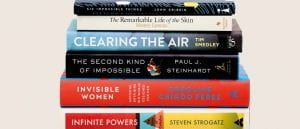To coincide with World Mental Health Day on 10th October 2019 our Deputy Head (Safeguarding), Mrs Lynch, has put together a Mental Health Awareness Week (7th – 12th October) to raise awareness of the importance of good mental health and how we can all help with our own and others’ wellbeing. The library is keen to support this initiative and highlight ways libraries and reading can support wellbeing. Don’t forget it’s Libraries Week too! There are many articles and research reports linking reading for pleasure and improved wellbeing. The National Literacy Trust has an article on Mental wellbeing, reading and writing and an in depth research study on this subject from 2017 – 2018. Similarly the Reading Agency: Reading for pleasure builds empathy and improves wellbeing research from the reading agency finds.
Libraries are non-judgmental, welcoming places and we love to see all students, parents, visitors and staff (and in particular their toddlers who confidently stride over to the picturebook boxes to take out ‘The Day the Crayons Quit’ for the nth time to the inward groans of their parents!).
 Dog drop-ins in the Library next Monday to Wednesday.
Dog drop-ins in the Library next Monday to Wednesday.
If you love dogs like me you’ll be pleased to hear we are having some visits to the library next week. If you are missing your pet why not come along for some time with staff dogs at break and lunchtime? The dogs always enjoy being made a fuss of by the students. In the past we’ve had special days when friendly dogs have visited us in the library as a break from intense revision and exam stress in the summer term but this time we are having dogs individually for a calmer, peaceful atmosphere. Mrs Lynch shared some interesting articles on the benefits of pets on stress and depression. It was good to see public libraries introducing times with dogs too – Three Edinburgh Libraries to trial dog friendly days
Cardiovascular effects of human-pet dog interactions.
Alleviating Anxiety, Stress and Depression with the Pet Effect
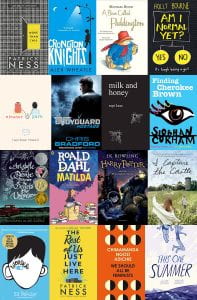 Mood-boosting books
Mood-boosting books
We are encouraging suggestions for your favourite mood-boosting books. Add your favourites to the flip-chart in the library next week and we’ll compile a list. My husband and son both went for ‘The Hitchhiker’s Guide to the Galaxy’ by Douglas Adams as their top feelgood read. Over lunch today teaching colleagues recommended Factfulness by Hans Rosling, The Great Gatsby, The Count of Monte Cristo by Alexandre Dumas and Middlemarch by George Eliot.
Here is a list of feelgood books put together by young people: Mood-boosting Books – A 2018 list chosen by young people
You can read about this in a blog post from the Reading Agency – Moodboosting books for young people – blog post
I also came across a nice libguide from Exeter University promoting their Wellbeing book collection
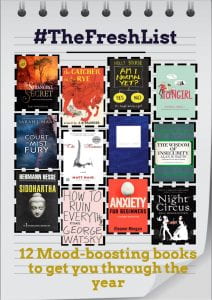 Exeter University students have also put together a collection of books to recommend to new students called ‘The Freshlist’ – 12 Mood-boosting books to get you through the year. I also loved ‘The Humans’ by Matt Haig.
Exeter University students have also put together a collection of books to recommend to new students called ‘The Freshlist’ – 12 Mood-boosting books to get you through the year. I also loved ‘The Humans’ by Matt Haig.
Shelf-help – Books on Prescription
As well as escapist fiction or gritty reality stories or weepy books which can make us feeling surprisingly better at times we have a collection of factual books to help with mental health issues. We stock the books on the Reading Agency ‘Reading Well’ list which is described as:
Reading Well Books on Prescription helps you to understand and manage your health and wellbeing using self-help reading. The books are chosen by health experts and people living with the conditions covered. People can be recommended a title by a health professional, or they can visit their local library and take a book out for free.
The books are on a range of issues including ADHD, Anxiety, worry and panic, Autism and Asperger syndrome, body image and eating disorders, bullying, confidence and self-esteem, depression, mood swings, OCD, self-harm and stress.
Book suggestions on reading for wellbeing
- The reading cure : how books restored my appetite by Laura Freeman
- The novel cure: An A-Z of Literary Remedies by Ella Berthoud and Susan Elderkin This is a fascinating book to dip into with suggested books for any number of maladies from long-windedness (the cure being Cormac McCarthy as The Road is ‘an exemplary model of short-windedness’) to stubbed toe, low self-esteem and being different.
Chess and Boardgames
As well as being a place for quite individual study and group study where projects are discussed and revision worked on together, the library offers big chess, small chess and now an electronic chess set – play against the set itself using an app and an informal gathering place in the foyer particularly popular at break and lunchtime. We’ve set up a jigsaw for anyone to add to and work on during spare minutes. This provides a lovely opportunity for informal conversations and different groupings of staff and students. Quick to play board and card games are available to borrow from the library – Dobble and Wordaround are the top favourites.
Projects promoting reading for pleasure and shared reading
There are many schemes and collections promoting the value of reading for pleasure. Some Universities have excellent schemes to encourage new students to keep reading for pleasure. Kingston University initiated the Big Read – giving a novel to all new students and having author talks and discussions about the book. This year they chose to give out ‘The Unlikely pilgrimage of Harold Fry’ by Rachel Joyce. This is wonderful project which fosters a sense of community and belonging and gives staff and students a focal point for informal chats and sharing the enjoyment of talking about a good book. Edgehill University have joined the scheme too. We are planning to have a Wellington College Big Read next summer to bring the College community together over a shared reading experience.
Getting lost in an epic fantasy novel (preferably with many books in the series!) can provide wonderful escapism from daily stresses or worries. We stock a wide range of fiction from fantasy to graphic novels, short stories, contemporary literary fiction to the classics. We have quick reads and film tie-ins. We now have Wheelers eplatform so that staff and students can listen to an audio book on their way to long away Sports matches on the app on their phones. We stock plenty of interesting and readable non-fiction to extend your subject knowledge too.
What does the library offer:
- Audio books – Particularly popular titles are ‘Ready Player One’ and The Alchemist by Paulo Coelho
- Graphic novels
- E-books from Browns Books for Students VLeBooks
- A place to meet and discuss – the library is the venue for many academic and cultural clubs and societies such as Debating, Med Soc, Creative Writing, Phil-Thy (Philosophy and Theology), Pheng (Philosophy and English) and Public Speaking.
- Popular science – in particular the Royal Society Science Book Prize Shortlists (current and from the past few years) Join in with the Science discussion group by reading one of this year’s shortlisted books.
- YA fiction – I’ve been recommending the ‘Scythe’ books by Neal Shusterman and these are proving hugely popular.
- Contemporary literary fiction
- Shelf help – Reading Agency -reading well – Books on Prescription – young people and mental health
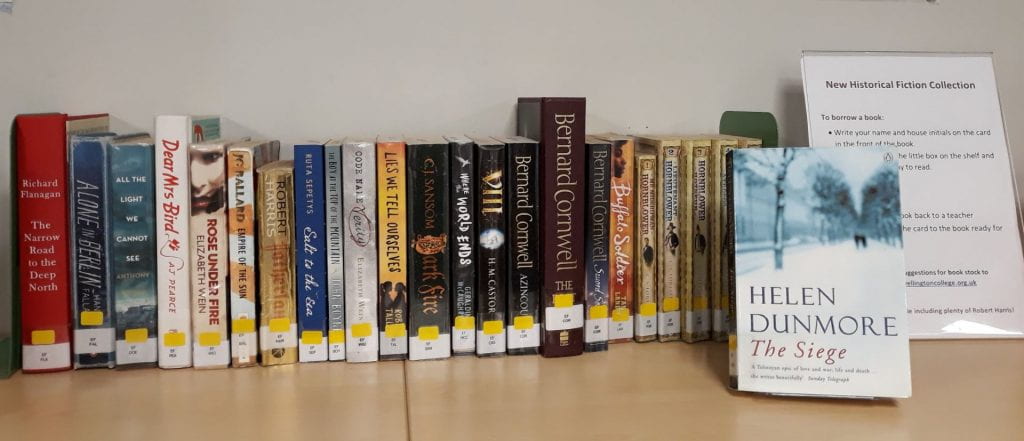 When Mr Macleod, Acting Head of History, came to me proposing the development of a Historical Fiction collection in the History Department Library, I jumped at the chance to bring some excellent and very readable fiction to a wider audience. Historical Fiction is a great way to become engrossed in a gripping plot, learn more about the real historical figures and expand your knowledge of a particular historical event or time period without it feeling like hard work. Many historical fiction writers have carried out meticulous research and some give detailed bibliographies of historical sources. Whilst important to remember the novels are fiction they help give context and background to historical time periods and topics and may act as a stepping stone to reading non-fiction.
When Mr Macleod, Acting Head of History, came to me proposing the development of a Historical Fiction collection in the History Department Library, I jumped at the chance to bring some excellent and very readable fiction to a wider audience. Historical Fiction is a great way to become engrossed in a gripping plot, learn more about the real historical figures and expand your knowledge of a particular historical event or time period without it feeling like hard work. Many historical fiction writers have carried out meticulous research and some give detailed bibliographies of historical sources. Whilst important to remember the novels are fiction they help give context and background to historical time periods and topics and may act as a stepping stone to reading non-fiction.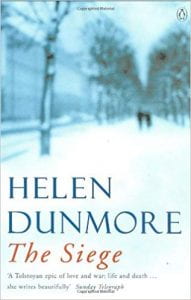 Two memorable historical fiction titles which made a dramatic impact on me are ‘The Siege’ by Helen Dunmore and ‘The things they carried’ by Tim O’Brien. Both are harrowing, emotional reads.’The Siege’ is set during the first winter of the siege of Leningrad by the Germans during World War ll. It is a moving story of love and survival written so well it’s hard not to feel the emotions of the characters experiencing it.
Two memorable historical fiction titles which made a dramatic impact on me are ‘The Siege’ by Helen Dunmore and ‘The things they carried’ by Tim O’Brien. Both are harrowing, emotional reads.’The Siege’ is set during the first winter of the siege of Leningrad by the Germans during World War ll. It is a moving story of love and survival written so well it’s hard not to feel the emotions of the characters experiencing it.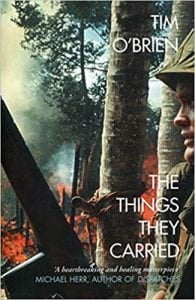 ‘The things they carried’ is a book of interconnected short stories about the experiences of a platoon of U.S. soldiers during the Vietnam War. It is a blurring of fiction and non-fiction as the narrator is modelled on the author and has his name, Tim O’Brien, despite being a fictional character. The book is partly based on the author’s own experiences.
‘The things they carried’ is a book of interconnected short stories about the experiences of a platoon of U.S. soldiers during the Vietnam War. It is a blurring of fiction and non-fiction as the narrator is modelled on the author and has his name, Tim O’Brien, despite being a fictional character. The book is partly based on the author’s own experiences.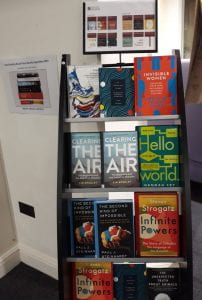 I’m looking forward to reading ‘Clearing the Air’ by Tim Smedley and I’m currently listening to the audiobook of ‘Invisible Women: Exposing data bias in a world designed for men’ by Caroline Criado Perez. This year’s winning book is an incredible piece of research highlighting the gender data gap in so many areas of life – a vital read for everyone.
I’m looking forward to reading ‘Clearing the Air’ by Tim Smedley and I’m currently listening to the audiobook of ‘Invisible Women: Exposing data bias in a world designed for men’ by Caroline Criado Perez. This year’s winning book is an incredible piece of research highlighting the gender data gap in so many areas of life – a vital read for everyone.